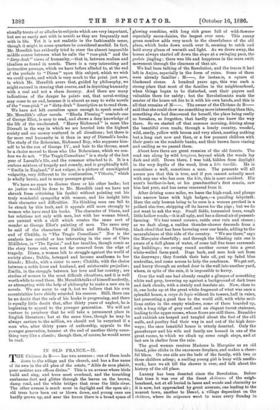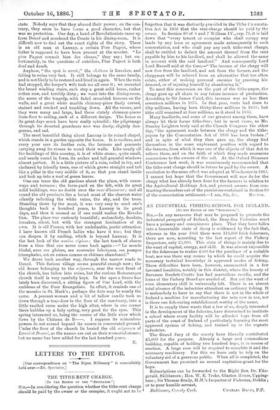IN OLD FRANCE.—IL
THE Chateau de B— has two avenues ; one of them leads down to the village and the church, and has a fine name of its own in the old plan of the estate, " All& de mon plaisir, pour assister aux offices divine." This is an avenue where birds build and sing, and trees meet overhead, and the trembling sunbeams dart and glitter through the leaves on the brown, damp road, and the white bridges that cross the little river. The other avenue is much more in daylight and the open air ; old trees have been cut or blown down, and young ones are hardly grown up, and near the house there is a broad space of glowing sunshine, with long rich grass fall of wild-flowers, especially moon-daisies, the largest ever seen. This sunny green meadow adds very much to the cheerfulness of the old place, which looks down south over it, seeming to catch and hold every gleam of warmth and light. As we drove away, the horses always started off down the slope at a swinging pace, the grelots jingling ; there was life and happiness in the mere swift movement through the clearness of that air.
We had been talking of the Revolution, and the traces it had left in Anjou, especially in the form of ruins. Some of them were already familiar : M—, for instanze, a square of blackened stones. A hundred years ago, this was such a strong place that most of the families in the neighbourhood, when things began to be disturbed, sent their papers and valuables there for safety ; but the Revolutionists mule the master of the house set fire to it with his own hands, and this is all that remains of M—. The owner of the Chateau de B— said that she could show me something more interesting than this, something she had discovered for herself, the place being really so forsaken, so forgotten, that hardly any one knew the way there. So we started off that summer morning, driving along the beautiful even roads, through a lonely country, wooded, wild, sandy, yellow with broom and very silent, meeting nothing but a long cart now and then, or a few peasant children with their goats on the roadside banks, and their brown faces staring and smiling as we passed them.
About here there are great remains of the old forests. The road ran along by wild braybres, beyond which the woods lay dark and still. Down there, I was told, hidden from daylight in the very depths of the wood, lives a bête terrible. He is sometimes a wolf, sometimes a man. The peasants will all assure you that this is true, and if you cannot actually meet with any one who has seen the bete, this is mere accident. His aunt's brother-in-law, or his grandmother's first cousin, saw him last year, and has never recovered from it.
After driving some miles, we leave the high-road, and plunge into narrow lanes with high hedges,—a puzzling labyrinth. Here the only human being to be seen is a woman perched in a pollard elm-tree, stripping off its leaves for the pigs ; but we do not want to ask the way. Small fields, tormented trees, rough little hollow roads,—it is all ugly, and has a dismal air of peasant- farming. We tear round corners, rattle over rats and stones ; as we dash along, a sudden thunder-shower descends from a black cloud that has been hovering over our heads, adding to the mournfulness of this side of the country. "We are there," says the Marquise cheerfully ; and through the blinding rain one is aware of a dull gleam of water, of some tall fine trees surround- ing buildings ; we swing round another corner into a great white-walled farm-yard. Dogs bark, and men look out from the doorways ; they flourish their hats off, put up faded blue umbrellas, and come across to help the coachman. We get out,. and hurry through an arched door in the wall into another yard, where, in spite of the rain, it is impossible to hurry.
Over the wall one had already caught a glimpse of something white and grey, towering up against a background of dark trees and dark clouds, with a stately and desolate air. Now, close to it, one looks up at the great white fragment of what was once a splendid house, a corps de logis without its towers, half in ruins, but presenting a good face to the world still, with white mul- lions entire in the empty windows, some of them boarded up, with a long ridge of grey roof, and an elegant turret staircase, leading to the upper rooms, whose floors are still there. Brambles and rubbish are heaped and tangled about the foot of the old walls, and poultry find their way in and out of the high door- ways ; the once beautiful house is utterly deserted. Only the gamekeeper and his wife and family are housed in one of the great rooms, to which we climb up some rough steps, and at last are in shelter from the rain.
The good woman receives Madame la Marquise as an old friend, piles sticks in the enormous fireplace, and makes a cheer- ful blaze. On one side are the beds of the family, with two or three children asleep; a smiling young girl is busy with needle- work; here we sit till the shower is over, and talk about the history of the old place.
Lannay has been deserted since the Revolution. Before that time it was one of the finest cluiteans of the neigh- bourhood, not at all buried in lanes and woods and obscurity as it is now, but approached by great avenues, one leading to the nearest town, another to Denz6, a village dependent on the cluiteau, where its seigneurs went to mass every Sunday in state. Nobody says that they abused their power; on the con- trary, they seem to have borne a good character, but that was no protection. One day, a band of Revolutionists came up from Denze and murdered the Comte in his dining-room. It is difficult now to find out the exact rights of the story. There is an old man at Launay, a certain Pere Pageot, whose father is supposed to have been present at the murder. "Le pere Pageot connait bien des choses," they Bay; but un- fortunately, to the questions of outsiders, Pere Pageot is both deaf and dumb.
Anyhow, "the spot is curst ;" the chciteau is forsaken, and falling to ruins very fast. It still belongs to the same family, and is not likely to be restored and lived in again. When the rain had stopped, the keeper's wife took me all over it ; we mounted the broad winding stairs, each step a great solid beam, rather rotten now, and terribly dirty ; we went into the dining-room, the scene of the tragedy, with faded crumbled frescoes on the walls, and a great white marble chimney-piece finely carved, stained and cracked and tumbling down. All the rooms, and they were many and large, had these stately chimney-pieces from floor to ceiling, each of a different design. The house in its great days must have been really splendid ; the pilgrimage through its deserted grandeurs now was dusty, slightly dan- gerous, and sad.
The most beautiful thing about Launay is its ruined chapel, which stands in a garden opposite the house. It is roofless, and every year sees its further ruin, the farmers and peasants carrying away its stones to mend their walls. Like nearly all the buildings of this country, it is of white stone ; quite small, and nearly round in form, its arches and tall graceful windows almost perfect. It is a little picture of a ruin, veiled in ivy, and sheltered by friendly trees, one of which grows straight and tall like a pillar in the very middle of it, so that you stand inside and look up into a roof of green leaves.
One can trace the old gardens about the place, with cause- ways and terraces ; the farm-yard on the left, with its great solid buildings, was no doubt once the cour d'honneur ; and all round the old precincts lies a broad moat of the clearest water silently reflecting the white ruins, the sky, and the trees. Standing there by the moat, it was very easy to send one's thoughts back a hundred years, to Launay in its great days, and then it seemed as if one could realise the Revolu- tion. The place was curiously beautiful ; melancholy, desolate, forsaken, silent, but with the strangest fascination of its own. It is old France, with her undefinable, poetic attraction. I have known old French ladies who have it too ; but they can deepen it by smiling, which is beyond Launay. It is the last look of the ancien regime; the last touch of charm from a time that can never come back again :—" Le monde feodal, avec ses gloires, ses souvenirs herolques, ses pompes triomphales, est en raines comma ce °Mama abandonne."
We drove back another way, through the narrow roads to Denze. This furious village seems peaceful enough now ; the old house belonging to the seigneurs, near the west front of the church, has fallen into ruins, but the curious Romanesque church itself is very carefully kept. In the apse a fresco has lately been discovered, a sitting figure of Our Lord, with the emblems of the Four Evangelists. In effect, it reminds one of the mosaics in St. Mark's ; perhaps the date may be nearly the same. A peasant woman and a bit of tallow candle took us down through a trap-door in the floor of the sanctuary, into a little vaulted room under the high altar, where in one corner There bubbles up a holy spring, very good for the eyes. This spring interested us, being the source of the little river which flows by the Chittean de B—. I suppose its miraculous powers do not extend beyond its source in consecrated ground. Under the floor of the church lie buried the old seigneurs of Lamle et Denese, as the names are cut on their memorial-stones; but no name has been added for the last hundred years.
E.



































 Previous page
Previous page